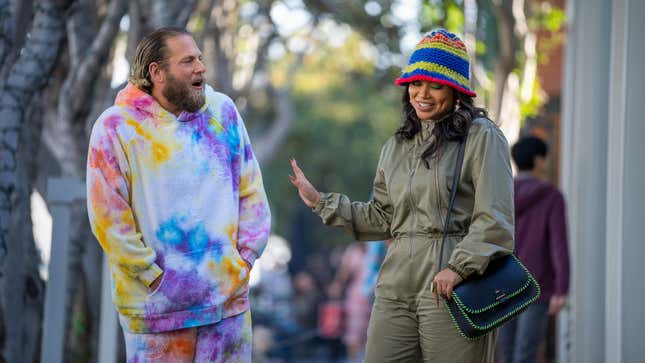‘You People’ and the Tediousness of the Interracial Romcom
My biggest issue with Kenya Barris' new film is not what it is, but what it could be. I can’t get mad at a film that doesn’t invite me to feel anything.
EntertainmentMovies

The first thing to understand about You People, Kenya Barris and Jonah Hill’s new Netflix comedy, is that it is not a movie about people—not in any real sense. You People is focused less on character or story and more on its central idea: that the problem with interracial relationships is not the couple but the social forces that surround them, represented in this case by a white Jewish family and a Black Muslim family who awkwardly clash when their kids fall in love. Hilarity (kind of) ensues.
Jonah Hill plays Ezra, a 35-year-old hypebeast with a boring job who dreams of launching a podcast on “the culture” with his best friend, Mo (Sam Jay). After an initial 15 minutes that largely centers on Ezra’s life, family, and friends, we finally meet Amira (Lauren London), a Black costume designer from Baldwin Hills. Throughout the movie we are asked to believe that this pair are in love, though there’s very little evidence to support this idea.
There is a brief dating montage—trips to sneaker stores and museums, lunch, midday strolls, a few extremely chaste kisses and one single suggestion of sex. But there is little in the way of chemistry, mostly because the couple—particularly Amira—are so shallowly realized as individuals. There is no room for chemistry because the couple is incidental and maybe even irrelevant to the film; their purpose is to symbolize a political issue and catalyze the antics of Ezra’s clueless white liberal mom (Julia Louis-Dreyfus) and Amira’s pro-black, Louis Farrakan-loving dad (Eddie Murphy).
Which, fine—this film does not pretend or even attempt to be anything more than just one long joke about oppression Olympics, white liberal guilt, Black exasperation, and racial tension in the form of awkward banter. Every scene has the energy of a quickly-improvised skit that always ends with someone saying something offensive and someone else being offended. The concerns and observations and humor of this movie feel very 2014 in that way. Some of it is “true,” but very little of it is actually funny—and that is frustrating, because on paper this should be a very, very funny movie. But not even the brilliance of comedy legends like Louis-Dreyfus, Murphy, Mike Epps, and Kym Whitley can illuminate the weirdly out-of-date comedy. There are only so many times one can hear a “N***as in Paris” joke and still be able to crack a smile.
-

-

-

-

-

-

-

-

-

-

-

-

-

-

-

-

-

-

-

-

-

-

-

-

-

-

-

-

-

-

-

-

-

-

-

-

-

-

-

-








































